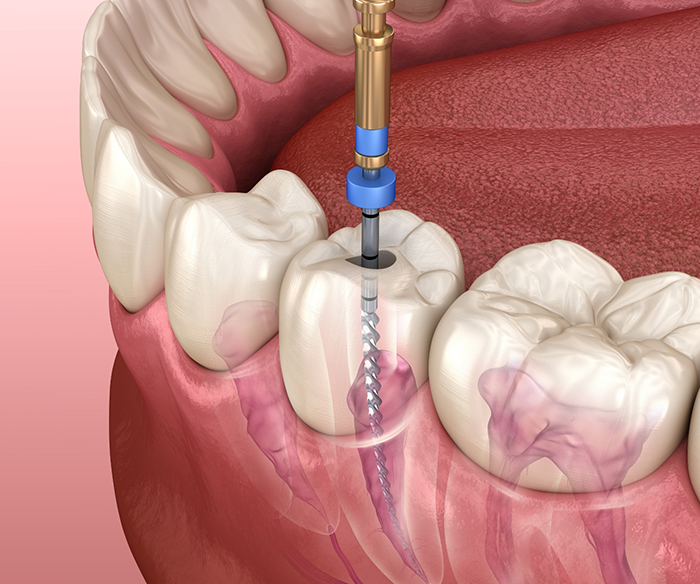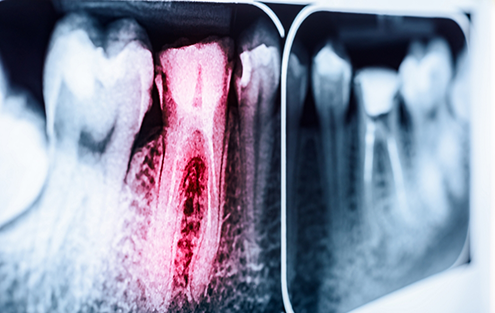Root Canal Treatment Torrance
Enjoying Life with a Pain-Free, Healthy Smile

The reputation that precedes root canals is not great. You may have said, “I’d rather have a root canal…” to indicate how very little you would enjoy an activity. If you do need a root canal, however, we have good news - the rumors about them being painful aren’t true! Actually, root canals can significantly relieve pain. Let the Blue Coast Dental Group offer root canal treatment to restore oral health, relieve pain, and save a tooth that may otherwise need to be extracted. Keep reading or contact our team to find out more today about root canal treatment in Torrance, CA.
Why Choose Blue Coast Dental Group for Root Canal Treatment?
- Sedation Dentistry is Available
- Same-Day Dental Emergency Appointments
- Trusted Dental Specialists on Staff
Why You Might Need a Root Canal

Root canals are procedures recommended for patients who experience tooth decay or damage that involves the innermost layer of the tooth called the pulp. Because the nerve system is housed within the pulp, patients who need a root canal often experience severe pain or dental sensitivity. The only way to know for sure that you need a root canal is to visit your trusted dentist. However, some of the warning signs include:
- Severe toothache - Either sharp pain when biting down or a dull ache, on some occasions both
- Dental sensitivity - Lingering discomfort after exposure to hot or cold foods and beverages that do not abate quickly, especially if you do not typically have sensitive teeth
- Darkening of one tooth - Usually near the gumline
- Infection, sores, or inflammation of the gum tissue surrounding one particular tooth
The Root Canal Process

A root canal is actually a relatively straightforward procedure. To ensure complete comfort, we numb the area around the damaged tooth. Then, we create a small access hole from the top of the tooth into the pulp layer. We carefully extract all the pulp and nerve tissue through the access hole and debride (clean out) the inside of the tooth. Next, we refill the prepared tooth with a biologically similar substance called gutta-percha. We then reseal the access hole using a composite filling material. In most cases, we also place a dental crown over the top of a root canal-treated tooth. This strengthens and protects the tooth to prevent any further damage or decay.
The Importance of Preventive Dental Care

In most cases, we see patients needing root canals on an emergency basis because an injury has damaged their teeth, or a lack of preventive care has led to severe decay. Fortunately, most root canals can be prevented with improved oral hygiene. That means better daily brushing and flossing routines at home as well as visiting your Torrance dentist at least every six months.
Understanding the Cost of Root Canals

As you may have guessed, multiple factors go into determining the cost of root canal treatment. That’s why we need to conduct a thorough exam before we can provide you with an accurate estimate of the price! In the meantime, you can read on to learn more on the topic – from whether or not it’s cheaper to extract your tooth to if dental insurance typically covers a portion of the cost.
Factors That Can Affect Root Canal Cost

To determine the cost, we need to consider:
- The location and type of tooth. Compared to your front teeth, molars have a more complex anatomy. Therefore, the latter typically costs a bit more.
- The complexity of your case. With a dentist, prosthodontist, periodontist, and oral surgeon at our Torrance dental office, we rarely have to refer our patients to an outside specialist. However, it is something you need to consider, particularly if you’re visiting an office that doesn’t have all of these professionals in-house.
- Any additional services that are needed. For example, the restoration that’s used to protect the treated tooth moving forward, like a dental crown.
Is it Cheaper to Pull My Tooth?

Initially, you might think so! However, it’s important to consider the short and long-term costs. For example, tooth extraction might be cheaper. However, you need to fill the gap in your smile ASAP with a dental bridge, denture, or dental implant (and each comes with its own price). If you don’t, then numerous other problems can arise – from bone loss to a misaligned bite – which can be costly to fix. Simply put, although root canal treatment might require a higher investment upfront, it is also typically a one-time treatment, and patients can enjoy the results for a lifetime.
Does Dental Insurance Cover Root Canal Treatment?

Typically, yes! Although the fine print on dental plans varies, it’s common for providers to cover anywhere from 40% to 80% of the cost. Of course, waiting periods, annual maximums, and the like will also play a role in your available benefits. Don’t worry – our team at Blue Coast Dental Group is happy to welcome dental insurance. In fact, we are in-network with some of the nation’s most popular providers, including Aetna, Anthem, Cigna, and Delta PPOs!
Other Options for Making Root Canal Treatment Affordable

With us, there is more than one way to save. In addition to welcoming dental insurance, we offer our patients the following financial solutions:
- Flexible Financing – Instead of paying for the entire cost of your treatment at once, you can space out your payments into manageable chunks.
- In-House Membership Plan – In addition to saving on essential preventive care, you can enjoy perks like a free emergency exam and a 20% discounted fee schedule.
- Special Offers – With our periodic special offers, you can lower your out-of-pocket expenses while improving the health, function, and look of your smile.
Root Canal FAQs
What Should I Do Before a Root Canal?
For starters, you should eat a healthy meal the night before your root canal. (Junk food could upset the affected tooth.) Ensure the dinner doesn’t include alcohol, either, as the latter would aggravate your pearly white’s inflammation. The same goes for bad oral habits like smoking or teeth grinding.
After eating, the next step is to get a good night’s sleep before treatment. Not only will it make you less nervous, but it’ll also keep your immune system safe and help you recover more quickly.
Before your procedure, you might also want to take an over-the-counter pain reliever. Doing so will reduce the discomfort as the anesthetic’s numbness wears off.
How Long Does a Root Canal Take?
In general, a root canal in Torrance can be done in one appointment. For that reason, the treatment time can range anywhere from 30 to 90 minutes or more — it’ll depend on your tooth’s location. Sometimes, however, the therapy takes two visits. When that happens, the first appointment involves placing pain-relieving medicine on your tooth.
Keep in mind that molars have more root canals than front teeth. As such, your procedure will take longer if your pearly white is further back in the mouth.
How Much Pain Is Normal After a Root Canal?
Thankfully, the root canal procedure itself shouldn’t hurt. That being said, you may feel some soreness for a few days post-treatment.
Once the anesthesia wears off, you’ll likely experience mild pain and sensitivity. Still, this effect is temporary and can be managed with OTC pain relievers. Examples of the latter medicines include acetaminophen and ibuprofen.
While you wait for the discomfort to pass, you’ll need to be careful of your tooth. As such, try to avoid chewing hard foods during the recovery period.
How Long Does It Take to Recover from a Root Canal?
While root canal recovery differs for everyone, most patients can return to work or school the day after treatment. Even so, keep in mind that your mouth will feel sore for the next few days. Therefore, take prescribed or OTC medications as directed.
On the other hand, recovery is longer in some cases. For example, if your job requires physical labor, take the next two or three days off. Vigorous exercise would disrupt your procedure’s healing process.
Do I Need Antibiotics Before or After My Root Canal?
This is something that our team will need to discuss with you. Most of the time, taking antibiotics before or after the procedure will not be necessary. However, if you have some type of health condition that leaves you more susceptible to infections in general, then antibiotics may be prescribed as a precaution. Thus, a careful review of your medical history will be required before we can tell you for sure whether antibiotics are needed.
What Happens If You Wait Too Long for a Root Canal?
The consequences of delaying root canal treatment for too long can be very serious. The problem will grow more severe as time passes. Eventually, the pain might go away, but this is not the positive sign that you might think it is. Instead, it means that the infection has advanced to the point where the nerve inside the tooth has completely died. Ultimately, the infection could start to spread to other parts of your mouth, and it might even contribute to illness in the rest of your body.
Additionally, if root canal treatment isn’t performed in time, the tooth may eventually become completely compromised. Even if it could potentially have been saved before, it may reach the point where there’s no other choice but to extract it.
In short, it is in the best interest of your oral and overall health to have a root canal treatment performed as soon as possible, so take whatever steps are necessary to find room in your schedule.
Can Root Canals Be Prevented?
If you would like to keep your chances of needing a root canal treatment to a minimum, you need to make an effort to practice excellent oral hygiene. Taking proper care of your smile is key to preventing tooth infections. Some basic steps you should take include:
- Brushing thoroughly at least two times every day.
- Flossing daily to remove food and plaque trapped between the teeth.
- Rinsing with a mouthwash that has antibacterial properties.
- Visiting the dentist every six months for a checkup and cleaning.
Diet matters as well. You’ll be less likely to suffer from tooth infections and other oral health issues if you limit your intake of sugar and make a point of drinking lots of water.
Are Root Canals Safe?
Yes, root canal treatment is considered very safe. The procedure is successful in 95% of cases, and the teeth that receive the treatment can often last a lifetime afterward. There are rumors of root canal treatment increasing your risk for certain medical issues, but this is based on research from more than a century ago that has been thoroughly debunked.
That said, in rare cases, some bacteria may remain inside the tooth after root canal treatment and cause a new infection. As such, please let us know immediately if you experience swelling, fever, or any other symptoms that could indicate that reinfection has occurred.
